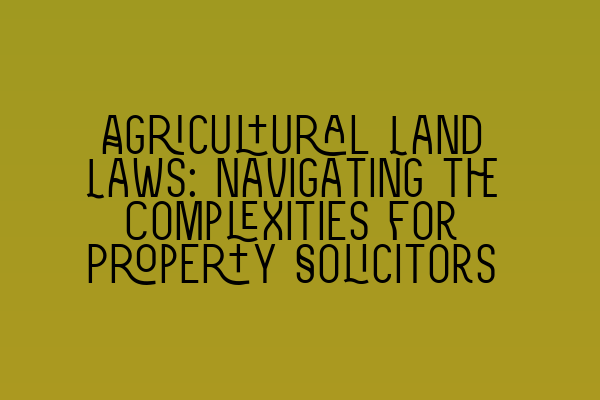Agricultural Land Laws: Navigating the Complexities for Property Solicitors
Welcome to the blog of SQE Property Law & Land Law, where we strive to provide insightful and comprehensive information for property solicitors. In this post, we will be diving into the complexities of agricultural land laws, an area of property law that requires a deep understanding of various legal frameworks and regulations.
Agricultural land plays a crucial role in our society, providing us with the resources we need to sustain ourselves. However, it is also subject to unique laws and regulations that can complicate property transactions and disputes. As a property solicitor, it is essential to navigate these complexities with precision and expertise.
Legal Frameworks for Agricultural Land
When dealing with agricultural land, property solicitors must be well-versed in the legal frameworks that govern its use and ownership. Here are some key legislation and regulations that apply:
- The Agriculture (Retirement and Settlement) Act 1992
- The Agricultural Holdings Act 1986
- The Basic Payment Scheme (BPS)
- The Countryside and Rights of Way Act 2000
- The Town and Country Planning Act 1990
Each of these regulations plays a unique role in shaping agricultural land transactions. Whether it’s advising clients on their rights and responsibilities as agricultural tenants or guiding them through the process of obtaining planning permission for agricultural developments, property solicitors must have a comprehensive understanding of these legal frameworks.
Issues Surrounding Agricultural Tenancies
Agricultural tenancies present specific challenges that property solicitors must address. These tenancies often have unique provisions and protections afforded to tenants, including secure tenancies under the Agricultural Holdings Act 1986. Understanding these provisions and their implications is crucial in advising clients on their rights and responsibilities.
Another area of concern is rent reviews for agricultural tenancies. Property solicitors must have a deep understanding of the factors that can affect the rent review process, including changes in agricultural prices, productivity, and improvements made to the land. By staying up to date with relevant case law and legislation, solicitors can effectively navigate the complexities of rent reviews and provide sound advice to their clients.
Dealing with Agricultural Land Disputes
Agricultural land disputes can arise from various sources, including boundary disagreements, rights of way, or disputes over the use of the land. As a property solicitor, it is essential to have strong dispute resolution skills and a robust knowledge of agricultural land laws to effectively represent your clients.
Alternative dispute resolution methods, such as mediation and negotiation, can be effective in resolving agricultural land disputes without costly and time-consuming litigation. By understanding the intricacies of agricultural land laws and leveraging negotiation skills, property solicitors can work towards finding mutually agreeable solutions for all parties involved.
The Importance of Staying Up to Date
As with any area of law, staying up to date with the latest developments in agricultural land laws is crucial for property solicitors. The landscape of agricultural land laws is constantly evolving, influenced by changes in legislation, case law, and government policies.
To ensure that you provide the best possible advice to your clients, it is essential to engage in continuous professional development. Attending relevant training courses and seminars, such as SQE Property Law & Land Law’s SQE 2 Preparation Courses and SQE 1 Preparation Courses, can help you stay abreast of the latest developments and strengthen your expertise as a property solicitor.
Conclusion
Agricultural land laws pose unique challenges for property solicitors. Navigating the complexities of agricultural tenancies, understanding the legal frameworks that govern agricultural land, and effectively resolving disputes requires a deep understanding of this specialized area of property law.
At SQE Property Law & Land Law, we are committed to providing the knowledge and resources necessary for property solicitors to excel in their practice. If you are preparing for the SQE exams, be sure to check out our SQE 1 Practice Exam Questions and SQE 1 Practice Mocks FLK1 FLK2 to enhance your preparation.
For more information on upcoming exam dates or to explore our range of training courses, visit our website and check out our SRA SQE Exam Dates page.
Stay tuned for more informative blog posts from SQE Property Law & Land Law, where we delve into various aspects of property law and provide valuable insights for property solicitors.
